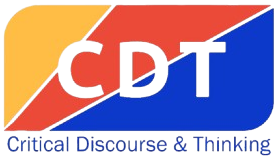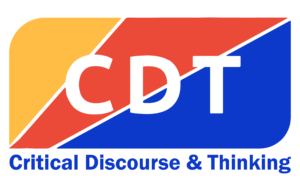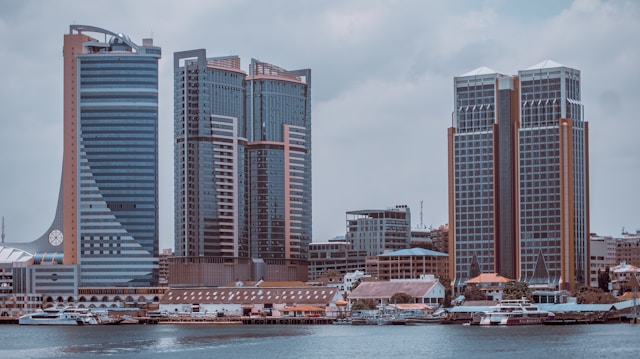Global Shifting Priorities
The world is facing a new industrial revolution, driven by artificial intelligence and unprecedented digitalization. Nations are redefining strategic priorities—tightening borders, redirecting aid, and prioritizing national self-interest. It is important that we assert a proactive stance in shaping our response. The question has shifted from whether change is coming, but how to respond to that change.
At the heart of this response lies critical thinking and strategic discourse—tools that help societies question, innovate, and lead. At CDT, we believe these tools are essential to shaping Africa’s future.
What Is Critical Thinking and Discourse?
Critical thinking is a process of asking better questions and going beyond surface-level answers. Critical thinking extends beyond theory—it’s the ability to ask better questions in the face of complexity. Think of it as the mental muscle behind progress.
It recognizes underlying assumptions, providing justifications for ideas and actions, evaluates these justifications through comparisons with varying perspectives, and assesses their rationality and potential consequences.
Discourse, on the other hand, is the practice of open and reflective dialogue—a commitment to overcoming egocentrism and sociocentrism, leading to a mindful approach to problem-solving.
A combination of critical thinking and discourse is the catalyst for change, enabling societies to reflect, challenge, and act in more meaningful ways.
Why It Matters Now
With protectionist policies and ideologies on the rise globally, international support is becoming less reliable. It is important for Africa to take a decisive role in shaping its destiny and protecting its interests in order to move from dependency to autonomy. This shift has to be reflected in the way it governs, innovates and educates its people.
Critical Thinking as a Foundation for Africa’s Socio Economic Transformation
1. Economy: From Dependency to Ownership
We cannot build resilient economies without first questioning the systems that shape them. Who owns our resources? Who benefits from our trade deals? Are we exporting raw materials while importing problems?
Critical thinking enables us to question unsustainable models and envision new economic strategies grounded in equity, ownership, and innovation. Our economic resilience can be strengthened by reclaiming ownership of our resources and value creation thereby reimagining the continent as a hub of creation rather than a site of consumption.
2. Governance: Free Speech
Where critical discourse is missing, bad leadership thrives. But when citizens engage, ask questions, and hold power to account, governance improves. Discourse is a democratic imperative. It sustains accountability, transparency, and long-term civic trust.
A thriving democracy depends on a thinking populace. Diverse voices, when empowered to speak and question freely, lead to stronger, more transparent leadership. Addition
3. Education: Raising A Generation Of Thinkers, Not Just Memorisers
Are African classrooms designed to cultivate thinkers or just students who memorize facts?
Education must do more than deliver information. It must nurture curiosity, intellectual confidence and individual agency. The future belongs to those who can reason independently, challenge the status quo and build on the work of the previous generation.
We must cultivate a generation capable of systems thinking, intellectual independence, and epistemic courage.
4. Health: Talking That Saves Lives
Public health shows us how vital discourse can be. Vaccine misinformation, stigma around mental illness, and silence around reproductive health all worsen when critical thinking is absent.
Transparent conversation and analytical thinking break stigma, debunk myths, and importantly save lives. This is important in creating timely interventions to medical crises that threaten life and impedes longevity.
5. Technology: From Consumers to Creators
Africa’s digital future hinges on more than access; it demands agency. Are we building our own platforms, or simply using those built elsewhere? Are we designing the algorithms that influence our thoughts, ideas, and lives, or are we being influenced by ones designed by others?
Critical thinking is key to moving from passive tech consumption to active innovation. Investing in homegrown solutions, nurturing tech leaders, and questioning the structure of the digital world, Africa can get involved in producing knowledge that serves its people in tech.
Why CDT Exists
At CDT, we don’t just believe in change—we build the intellectual infrastructure for it. We are on a mission to provide a new culture of thinking.
We build fellowships, conduct research, and host forums that champion thinkers and bold ideas.
Africa’s Agency
Africa’s future cannot be written by others. It must be shaped by those who know the continent best.
Our agency lies in the power to question, to imagine, and to lead. Through critical engagement and bold thinking, we reclaim not just narrative, but future.
, and assesses their rationality and potential consequences.
Discourse, on the other hand, is the practice of open and reflective dialogue—a commitment to overcoming egocentrism and sociocentrism, leading to a mindful approach to problem-solving.
A combination of critical thinking and discourse is the catalyst for change, enabling societies to reflect, challenge, and act in more meaningful ways.
Why It Matters Now
With protectionist policies and ideologies on the rise globally, international support is becoming less reliable. Africa cannot afford to be reactive; it must be proactive, move from dependency to autonomy, and protect its interests economically, and how it governs, educates, and cares for its people.
Critical Thinking as a Foundation for Africa’s Socio-Economic Transformation
1. Economy: From Dependency to Ownership
We cannot build resilient economies without first questioning the systems that shape them. Who owns our resources? Who benefits from our trade deals? Are we exporting raw materials while importing problems?
Critical thinking enables us to question unsustainable models and envision new economic strategies grounded in equity, ownership, and innovation.
2. Governance: Free Speech
Where critical discourse is missing, bad leadership thrives. But when citizens engage, ask questions, and hold power to account, governance improves.
A thriving democracy depends on a thinking populace. Diverse voices, when empowered to speak and question freely, lead to stronger, more transparent leadership.
3. Education: Raising Thinkers, Not Just Memorisers
Are African classrooms designed to cultivate thinkers or just students who memorize facts?
Education must do more than deliver information. It must nurture curiosity, intellectual confidence and individual agency. The future belongs to those who can reason independently, challenge the status quo and build on the work of the previous generation.
4. Health: Talking That Saves Lives
Public health shows us how vital discourse can be. Vaccine misinformation, stigma around mental illness, and silence around reproductive health all worsen when critical thinking is absent.
Transparent conversation and analytical thinking break stigma, debunk myths, and importantly save lives.
5. Technology: From Consumers to Creators
Africa’s digital future hinges on more than access; it demands agency. Are we building our own platforms, or simply using those built elsewhere? Are we designing the algorithms that influence our thoughts, ideas, and lives, or are we being influenced by ones designed by others?
Critical thinking is key to moving from passive tech consumption to active innovation. Investing in homegrown solutions, nurturing tech leaders, and questioning the structure of the digital world, Africa can get involved in producing knowledge that serves its people in tech.
Why CDT Exists
At CDT, we believe Africa’s future depends on its ability to think critically, speak boldly and engage the world. We are on a mission to provide a new culture of thinking.
We build fellowships, conduct research, and host forums that champion thinkers and bold ideas.
Africa’s Agency
Africa’s future cannot be written by others. It must be shaped by those who know the continent best.
Through critical thinking and courageous discourse, we reclaim our agency and build a continent not only rich in resources, but rich in ideas, dignity, and opportunity for generations to come.


